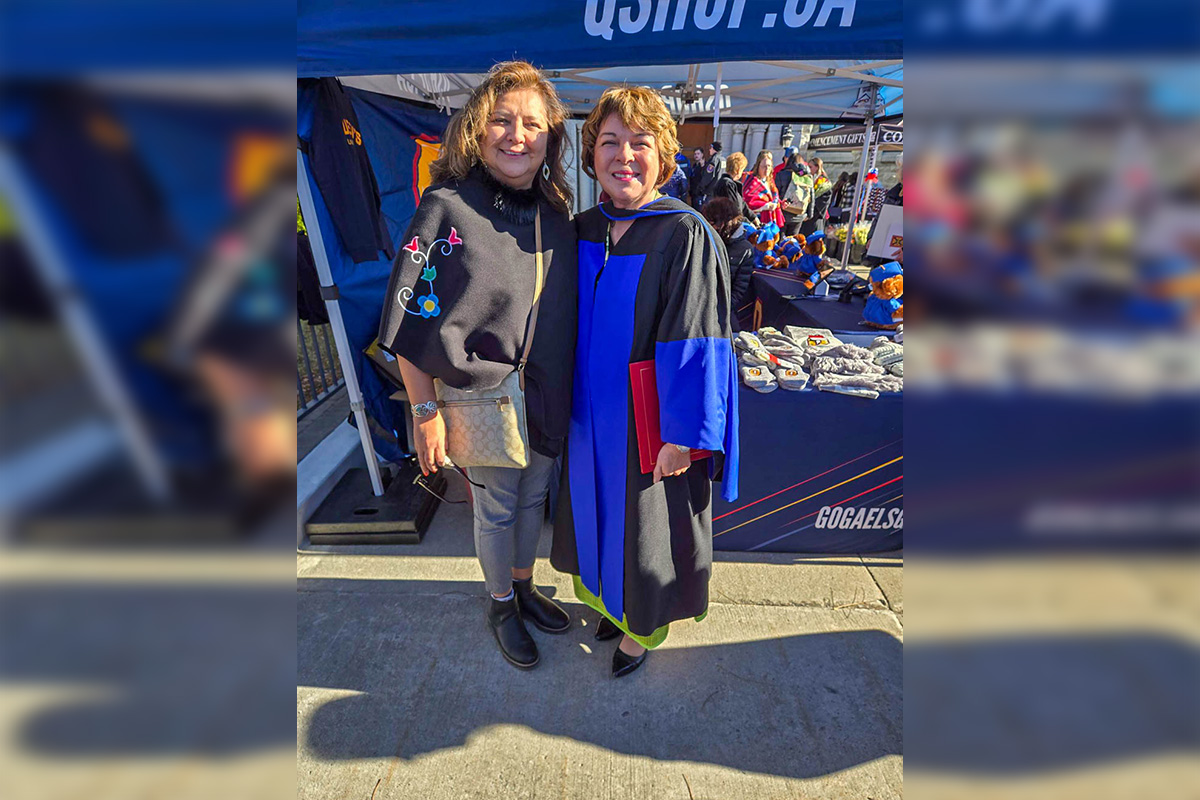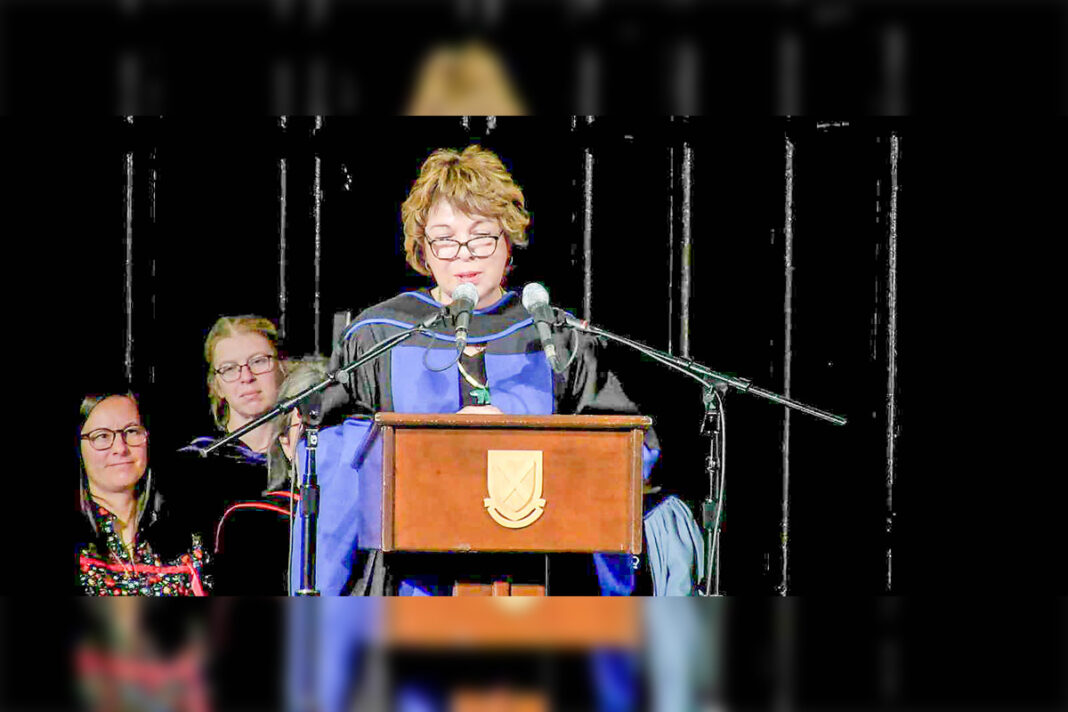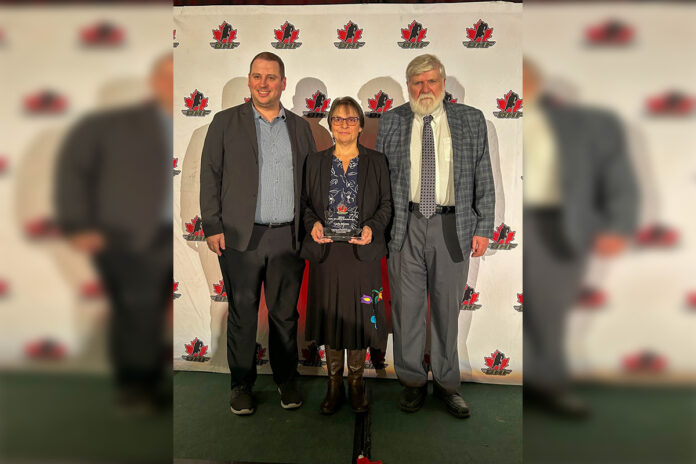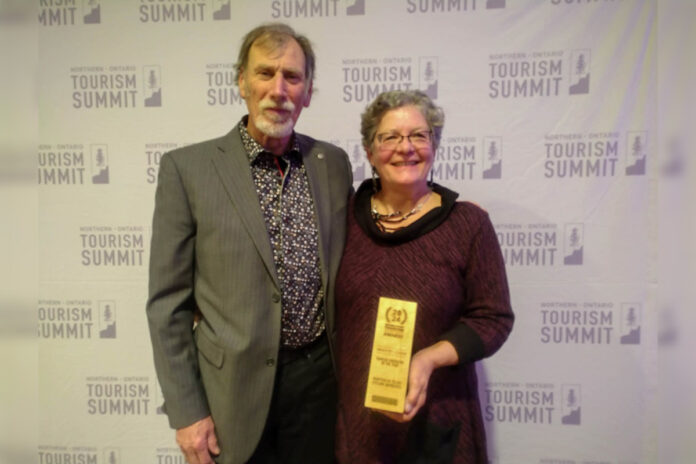M’CHIGEENG—Rhonda Hopkins, Anishinabemowin Professor at Kenjgewin Teg was recently bestowed with an Honorary Doctorate from Queen’s University.
“Rhonda definitely deserves this award,” said Beverley Roy, president of Kenjgewin Teg to Ms. Hopkins receiving the honorary doctorate, given the title Doctor of Laws. Rhonda has been part of Kenjgewin Teg for over 10 years and has shared her Anishinaabe knowledge with our various teams. We don’t honour people like Rhonda who have contributed so much, often enough. That is why I and her other nominators wanted to do it, to show how thankful everyone is for everything that she has done.”
“I am very happy and honoured to have received this award,” said Ms. Hopkins. “I actually knew about the award about a year ago and kept it under wraps. I received an Honorary Doctor of Law award.”
This is the second honorary doctorate award Ms. Hopkins has received in her career. The first was an honorary doctorate award of Education and Indigenous Education in July 2021 through the World Indigenous National University.

Mr. Roy, Stephanie Roy, Liz Oswamick and Jessica Shonias had all nominated Ms. Hopkins for this latest award in February 2023.
“Some may wonder why I and the other nominators chose to have an institution, such as Queen’s University, other than ours for example, bestow this recognition and award to Rhonda, who is representative of so many of our Anishinabek knowledge holders and keepers, and fluent speakers of Anishinaabemowin,” said Ms. Roy. “I would offer this as part of some insight: we also nominated Rhonda several years ago to the World Indigenous Nations University (WINU) for consideration of an honorary doctorate award as it was important to us as the nominators that we as Indigenous people recognize and honour our own people first, those who have done the work before us and often alongside us too as Indigenous peoples.”
“A practical reality is that we are in a world of ‘two-eyed’ seeing, and we continue actioning the vision of the dream of ‘First Nation Control of First Nation Education,’” said Ms. Roy. “As we continue to grow our teams and the work that we do, Kenjgewin Teg will soon reach that milestone too, when we will soon be honouring our own Knowledge Keepers and Holders in a similar way.”
“Rhonda returned home to Mnidoo Mnising (Manitoulin Island) in 2013 to begin her employment with Kenjgewin Teg after her work with other Anishinabek/Ojibwe communities in Michigan,” the nomination letter reads. “The history of colonization in Canada and the geographical borders and limitations have not prevented Rhonda from supporting Ojibwe/Anishinabek people across these imposed country borders between Canada and the US.”
“Since moving back to Manitoulin, Mnidoo Mnising, Rhonda has continued her involvement and continues to exude her passion for Anishinabemowin (Ojibwe language) learning and revitalization, and has been a crucial part of several programs, activities, and strategies to do so, both within her formal employment with Kenjgewin Teg and as an active and passionate member of the Anishinabek Nation broader community for language initiatives. Rhonda’s knowledge of Anishinabek teachings and their interconnectedness to language, origins and original meanings of our alive, motion-based and living language interpretations have been learned for her many years of living and learning from her traditional teachings that she has grown up with, and teachings that she also learned from various Elder teachers and mentors in her lifelong journey.”
“Rhonda is humble when it comes to sharing her traditional teachings and readily shares that she ‘does not know too much’ a quality that most traditional knowledge holders will often state in their humility,” the letter reads. “Both personally and professionally, Rhonda is a person often sought out for her advice, knowledge and Anishinaabe teachings by people of all ages and groups, and it is her humbleness in ‘sharing what little she knows’ (her words) that gains her the respect of her community and peers. Rhonda is consistently sought out as a mentor and teacher for new language learners. Rhonda has a positive outlook in all she does, and her Anishinabek humour and laughter make her a treasured mother, grandmother, and work colleague. With her personality and passion, she influences many around her.”
“Her work with Kenjgewin Teg has allowed her to continue to flourish and bring forward our local Anishinabek worldview in teaching and learning, all the while still being creative within the continued lingering of colonized boundaries that Kenjgewin Teg will often find itself in as a result of limited scope funding arrangements and agreements,” the letter reads. “Rhonda is a strong advocate of Indigenous education based on our Anishinabek worldview and often finds herself stretching the limits and boundaries between these two worlds in her work and community involvement.”
“The future outlook, however, on greater control of our Indigenous/Anishinabek education seems promising and in sight at Kenjgewin Teg, and this reality is still unfolding,” the letter continues. “Kenjgewin Teg is an organization that will soon be in the position of granting its credentials (certificates, degrees and diplomas) within an Indigenous quality assurance framework recognized by the Province of Ontario. As an essential Knowledge holder of the Anishinabek philosophy and worldview helping to guide Kenjgewin Teg, Rhonda will continue to be a crucial part of how and what this good work and exciting work ahead will be undertaken.”
It was explained, “The University of Victoria hosts a project and brings together nine Indigenous communities and organizations from across Canada. Each partner independently submits and monitors their respective research idea, that supports adult learners in learning their heritage language. As an institutional partner, Rhonda has been leading this SSHRC project on behalf of Kenjgewin Teg. Specifically, Kenjgewin Teg’s research project is developing an Indigenous language proficiency instrument, psychometrically validated, which includes working with an external consultant expert in the mechanics of innovative instrument development for Anishinabemowin (Ojibwe language) progression and assessment.”
“In 2016, Kenjgewin Teg and Canadore College launched Ontario’s first immersion-based Early Childhood Educator’s diploma program. As a fluent speaker and an immersion specialist with experience in various immersion programs in Canada and the states of Michigan and Kansas in the US, Rhonda was critical in designing the curriculum and course learning outcomes for this unique diploma program based on our Anishinabek worldview of children. In this ECE-A program, one key distinguishing feature Rhonda ensured within this new post-secondary program is the holistic development of the Anishinaabe child. Early childhood educator students in the ECE-A program learn and begin to implement with greater confidence the Seven Grandfather teachings and other practices of the Anishinabek, all within an Anishinaabemowin learning environment.”





